|
|
|
Sort Order |
|
|
|
Items / Page
|
|
|
|
|
|
|
| Srl | Item |
| 1 |
ID:
093895


|
|
|
|
|
| Publication |
2010.
|
| Summary/Abstract |
Israel's general elections in 2009 yielded three major outcomes: 1) the replacement of the bi-polar system that characterized Israeli electoral politics between 1977 and 2003 in which most parties are aligned to one of the two principal parties by a more flexible multi-party system. 2) The nearly total collapse of the Labor party and the Zionist left; for the first time since the 1920s, the Labor party was no longer a major political player, and 3). Kadima's electoral relative success, despite scandals haunting it since 2006. Kadima has basically superseded Labor without necessarily adopting its ideology. We argue (contrary to Henry Kissinger's quip that Israel never had a foreign policy but only a domestic policy) that primarily external factors and processes - chiefly the failure of the Oslo process in the 1990s - yielded these three outcomes.
|
|
|
|
|
|
|
|
|
|
|
|
|
|
|
|
| 2 |
ID:
122068
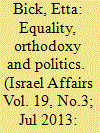

|
|
|
|
|
| Publication |
2013.
|
| Summary/Abstract |
National service was a controversial issue in Israel in the early years of the state. A law requiring religious girls exempted from the military to do two years of mandatory civic service was passed in August 1953 and never implemented. This article examines the political controversy surrounding the adoption of the national service law and concludes that David Ben-Gurion advanced the law mainly for political reasons in order to counterbalance concessions made to the orthodox. Moreover, consistent with his mamlachtiyut (statist) philosophy, he was unwilling to consider any compromise proposals other than a mandatory government-run programme. Pressure from the religious parties caused his successor, Moshe Sharett, to concede on the implementation details, voiding the law of content. Subsequent governments acceded to orthodox demands to freeze the law. In 1971, a more pragmatic Labour government headed by Golda Meir instituted a programme of voluntary national service which provided needed manpower to the development towns and fulfilled the wish of girls from the religious Zionist sector to give service to the nation.
|
|
|
|
|
|
|
|
|
|
|
|
|
|
|
|
| 3 |
ID:
187562
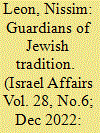

|
|
|
|
|
| Summary/Abstract |
The big drama of Israel’s four closely spaced national elections in 2019–21 was accompanied by another, smaller, drama: the country’s plunge into political chaos gave the Shas party an opportunity for electoral, organisational, and political revitalisation. The four election campaigns transformed Shas from a Mizrahi-Haredi party in decline, barely able to pass the minimum vote threshold, into a stable party practicing a tightly focused politics – living proof that Haredi politicians were again occupying positions of power and influence. Not only did Shas do outstanding organisational and political work; it also demonstrated an impressive ability to align with the Israeli right’s core national-political agenda: the connection between security and tradition. The language of the Shas message evolved from one election campaign to another: what started as a Haredi (ultra-Orthodox) discourse of cultural partnership with a religious-lite or masorti (traditionalist) public turned into a Zionist discourse of national partnership with a ‘right-lite’ voting public (Likud).
|
|
|
|
|
|
|
|
|
|
|
|
|
|
|
|
| 4 |
ID:
093897
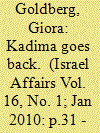

|
|
|
|
|
| Publication |
2010.
|
| Summary/Abstract |
Kadima lost the 2009 elections to the Likud after it had come to power in the 2006 elections. While Kadima only lost one seat (28 instead of 29), and even remained the largest party in the Knesset, it had no chance of remaining in power. Kadima is the most important phenomenon in the Israeli party system in recent years. Despite the fact that it did not win the 2009 elections its influence on the political system has been enormous. After its victory in 2006 Labour and Likud tried to copy it, as happens with every successful product. The best way to relate to Kadima is as a completely different phenomenon, in terms of the standard tools of the historical party map and the traditional division into blocs. This approach denies the former five conceptions of Kadima: a classic centre party, a neo-centrist party, a centrist party in the left bloc, a faction in the Likud or a middle party.
|
|
|
|
|
|
|
|
|
|
|
|
|
|
|
|
| 5 |
ID:
158145
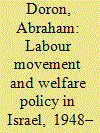

|
|
|
|
|
| Summary/Abstract |
This article reviews the attitudes of the Israeli labour movement, particularly the position of Mapai, the dominant party in that movement, regarding the development of welfare policy in Israel from the establishment of the state in May 1948 until May 1977, when Labour lost power to the Likud party. The review and discussion focuses on the development of social security ‒ the national insurance system, the welfare services ‒ the provision of assistance to people in need, as well as the personal care services, which are primarily provided by social work professionals.
|
|
|
|
|
|
|
|
|
|
|
|
|
|
|
|
| 6 |
ID:
093898
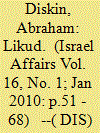

|
|
|
|
|
| Publication |
2010.
|
| Summary/Abstract |
In 1957 Downs claimed that most voters tend to hold centrist views. Hence, political parties should adopt centrist stands in order to attract as many voters as possible. Another aspect of the 'political centre' derives from prominent theories on coalition formation: the political party that captures the 'median' position in the parliament enjoys a tremendous advantage. The battle over the control of 'the centre' played a major role in the strategy of Likud in the 2009 Knesset elections, and in its ability to form a coalition following the elections. Although Kadima won one more seat than Likud, it lost the battle on the centre. Netanyahu, loyal to his centrist tendencies during the campaign, preferred to have only a segment of Labour in his coalition, at the cost of five ministerial posts, rather than to enjoy the support of the radical National Union at the cost of a single ministerial post.
|
|
|
|
|
|
|
|
|
|
|
|
|
|
|
|
| 7 |
ID:
163293
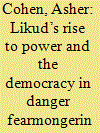

|
|
|
|
|
| Summary/Abstract |
The 1977 elections in Israel marked the first time since the country’s establishment in 1948 for a right-wing government to be elected. Immediately after this sea change, a ‘Democracy in Danger’ fearmongering discourse was instituted by representatives of academic, cultural, political and media elites. In fact, as this article shows, Likud’s ascendance served as a formative event of democratic transformation in the deepest sense of the word, strengthening and deepening Israel’s democratic identity that had hitherto been limited at most.
|
|
|
|
|
|
|
|
|
|
|
|
|
|
|
|
| 8 |
ID:
163288
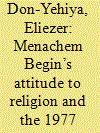

|
|
|
|
|
| Summary/Abstract |
The image of Herut as characterised by a strong linkage to Jewish religious tradition had a profound impact in the Israeli political arena. It motivated many of the religious and traditional public to support this party and later its successor, Likud. It also provided an incentive for the religious parties to join the government coalitions headed by Likud in the wake of the ‘political reversal’ of 1967. In this way, the public image of Likud as a ‘religious oriented party’ significantly contributed to the transformation of political power from Labour to Likud.
|
|
|
|
|
|
|
|
|
|
|
|
|
|
|
|
| 9 |
ID:
137544
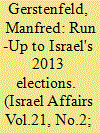

|
|
|
|
|
| Summary/Abstract |
On 15 October 2012, the 18th Knesset – which had been elected in February 2009 – voted unanimously to dissolve. The date for the elections for the 19th Knesset was then set for 22 January 2013. This article follows the events leading to the election day. It shows that there were four distinct phases during that period. It describes the internal organization and primary elections in Israel's major parties, Likud and Avoda; the debate about the formation of political alliances which led to the joint list of Likud–Israel Beiteinu; the stabilization of the political blocs; and the emergence of new political forces (such as Yesh Atid). The article also discusses the impact of major events, such as the military operation Pillar of Defence, on the elections and the electoral campaign. The article discusses the parties’ campaigns and the proliferation of opinion polls. It also shows that much of the campaigning of the parties was directed against other parties of the same bloc, be it the centre-right or the centre-left.
|
|
|
|
|
|
|
|
|
|
|
|
|
|
|
|
| 10 |
ID:
093896
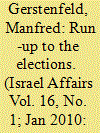

|
|
|
|
|
| Publication |
2010.
|
| Summary/Abstract |
On 26 October 2008 President Shimon Peres called for new elections. The Knesset was dissolved on 11 November. Three candidates claimed that they were in the running for prime minister: Livni, Netanyahu and Barak. The election campaign would focus more on individuals than on parties. The security issue took high priority in the elections. A major issue throughout the campaign was the position of the leading parties on the establishment of two states for two peoples as part of a peace agreement. The internet became a major tool in the campaign. On the morning of 27 December, the IDF began a war in the Gaza Strip, which Israel called Operation Cast Lead. The major parties agreed to suspend their campaigns until the end of the war. Kadima's victory with 28 seats came as a surprise. The Likud came second with 27 seats, having lost voters at the end of the campaign to the third largest party Yisrael Beiteinu, which ended up with 15 Knesset seats. Looking back at the election campaign one can best define it as a broken and shortened one.
|
|
|
|
|
|
|
|
|
|
|
|
|
|
|
|
|
|
|
|
|